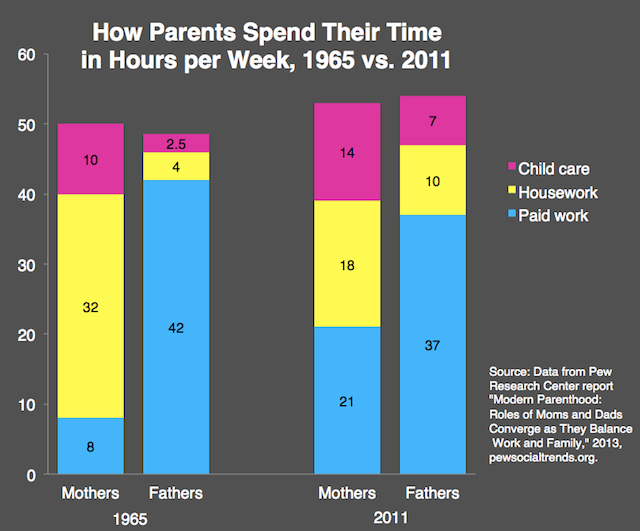Highlights
The Pew Research Center's new analysis of the 2010 American Time Use Survey offers a detailed look at how parents spend their time---and how they feel about it. Here are five highlights.
1. Moms and dads spend a comparable number of hours every week on leisure (24.5 for women, 27.5 for men); however, dads perform almost twice as much paid work per week (40.5 hours for men, 22.5 for women) and moms provide almost twice as much child care (13.5 hours vs. men's 7.3). Moms also do more housework: 17.4 hours per week to men's 10.
2. The differences in how fathers and mothers spend their time are significant; however, as the below figure illustrates, they're much smaller than they were in the mid-1960s. Today's moms do half as much housework and about two-and-a-half times as much paid work as their predecessors, while today's dads do a bit less paid work and over twice as much housework as the dads of 1965. Both dads and moms now spend more time with their kids ; in fact, dads have almost tripled their contribution to child care from 2.5 hours a week to 7. Especially given what we're learning about the role of fathers in child development, that's great news for kids.

3. Parents find over 60% of child care–related activities "very meaningful," and they feel "very happy" during 35% of them. That makes child care activities more meaningful on average than leisure, housework, and paid work, and more likely to produce happiness than anything besides leisure. Considering that the category "child care" includes not just playing with and talking to kids but also more mundane tasks, like driving them from point A to point B, those numbers are pretty impressive.
4. Mothers feel a lot more tired, whether they're engaging in child care, housework, paid work, or even leisure. Specifically, they feel "very tired" in 15% of child care activities, and 7 to 8% of other activities, whereas fathers only come close to these levels during child care activities (6% of which they find very tiring).
5. Despite their higher levels of tiredness (and in most categories, stress), moms were a bit more likely to find daily activities very meaningful and to say that activities made them very happy. Moms' and dads' mean ratings of activities (on a scale of 0 to 6) were usually pretty close, however, so maybe women were simply more likely to express strong feelings, whether positive or negative.














